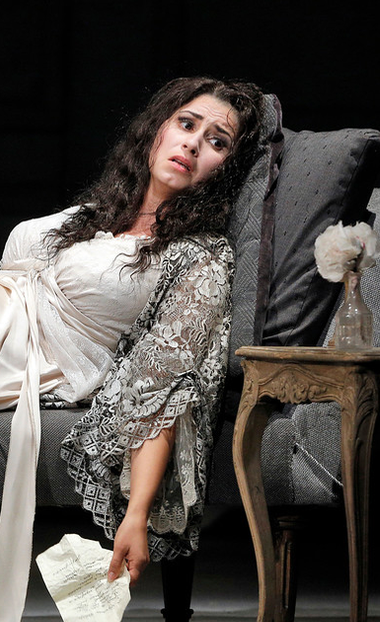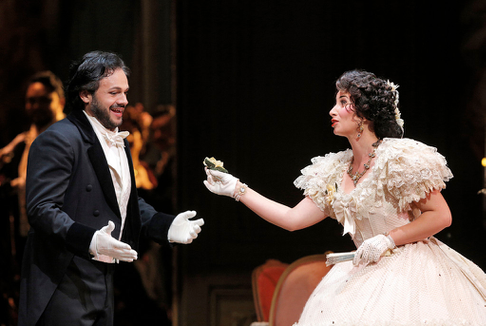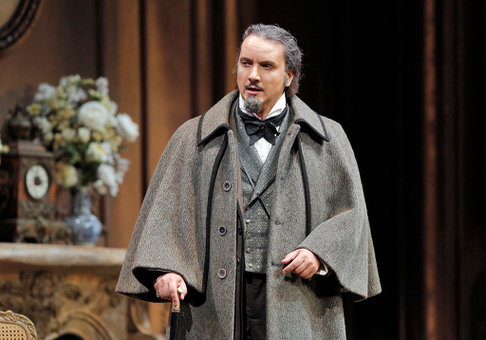
28 Sep 2017
La Traviata in San Francisco
A beautifully sung Traviata in British stage director John Copley’s 1987 production, begging the question is this grand old (30 years) production the SFO mise en scène for all times.
English Touring Opera are delighted to announce a season of lyric monodramas to tour nationally from October to December. The season features music for solo singer and piano by Argento, Britten, Tippett and Shostakovich with a bold and inventive approach to making opera during social distancing.
This tenth of ten Live from London concerts was in fact a recorded live performance from California. It was no less enjoyable for that, and it was also uplifting to learn that this wasn’t in fact the ‘last’ LfL event that we will be able to enjoy, courtesy of VOCES8 and their fellow vocal ensembles (more below …).
Ever since Wigmore Hall announced their superb series of autumn concerts, all streamed live and available free of charge, I’d been looking forward to this song recital by Ian Bostridge and Imogen Cooper.
The Sixteen continues its exploration of Henry Purcell’s Welcome Songs for Charles II. As with Robert King’s pioneering Purcell series begun over thirty years ago for Hyperion, Harry Christophers is recording two Welcome Songs per disc.
Although Stile Antico’s programme article for their Live from London recital introduced their selection from the many treasures of the English Renaissance in the context of the theological debates and upheavals of the Tudor and Elizabethan years, their performance was more evocative of private chamber music than of public liturgy.
In February this year, Albanian soprano Ermonela Jaho made a highly lauded debut recital at Wigmore Hall - a concert which both celebrated Opera Rara’s 50th anniversary and honoured the career of the Italian soprano Rosina Storchio (1872-1945), the star of verismo who created the title roles in Leoncavallo’s La bohème and Zazà, Mascagni’s Lodoletta and Puccini’s Madama Butterfly.
Evidently, face masks don’t stifle appreciative “Bravo!”s. And, reducing audience numbers doesn’t lower the volume of such acclamations. For, the audience at Wigmore Hall gave soprano Elizabeth Llewellyn and pianist Simon Lepper a greatly deserved warm reception and hearty response following this lunchtime recital of late-Romantic song.
Collapsology. Or, perhaps we should use the French word ‘Collapsologie’ because this is a transdisciplinary idea pretty much advocated by a series of French theorists - and apparently, mostly French theorists. It in essence focuses on the imminent collapse of modern society and all its layers - a series of escalating crises on a global scale: environmental, economic, geopolitical, governmental; the list is extensive.
For this week’s Live from London vocal recital we moved from the home of VOCES8, St Anne and St Agnes in the City of London, to Kings Place, where The Sixteen - who have been associate artists at the venue for some time - presented a programme of music and words bound together by the theme of ‘reflection’.
'Such is your divine Disposation that both you excellently understand, and royally entertaine the Exercise of Musicke.’
Amongst an avalanche of new Mahler recordings appearing at the moment (Das Lied von der Erde seems to be the most favoured, with three) this 1991 Mahler Second from the 2nd Kassel MahlerFest is one of the more interesting releases.
‘And there was war in heaven: Michael and his angels fought against the dragon; and the dragon fought and his angels, And prevailed not; neither was their place found any more in heaven … that old serpent … Satan, which deceiveth the whole world: he was cast out into the earth, and his angels were cast out with him.’
If there is one myth, it seems believed by some people today, that probably needs shattering it is that post-war recordings or performances of Wagner operas were always of exceptional quality. This 1949 Hamburg Tristan und Isolde is one of those recordings - though quite who is to blame for its many problems takes quite some unearthing.
There was never any doubt that the fifth of the twelve Met Stars Live in Concert broadcasts was going to be a palpably intense and vivid event, as well as a musically stunning and theatrically enervating experience.
‘Love’ was the theme for this Live from London performance by Apollo5. Given the complexity and diversity of that human emotion, and Apollo5’s reputation for versatility and diverse repertoire, ranging from Renaissance choral music to jazz, from contemporary classical works to popular song, it was no surprise that their programme spanned 500 years and several musical styles.
The Academy of St Martin in the Fields have titled their autumn series of eight concerts - which are taking place at 5pm and 7.30pm on two Saturdays each month at their home venue in Trafalgar Square, and being filmed for streaming the following Thursday - ‘re:connect’.
The London Symphony Orchestra opened their Autumn 2020 season with a homage to Oliver Knussen, who died at the age of 66 in July 2018. The programme traced a national musical lineage through the twentieth century, from Britten to Knussen, on to Mark-Anthony Turnage, and entwining the LSO and Rattle too.
With the Live from London digital vocal festival entering the second half of the series, the festival’s host, VOCES8, returned to their home at St Annes and St Agnes in the City of London to present a sequence of ‘Choral Dances’ - vocal music inspired by dance, embracing diverse genres from the Renaissance madrigal to swing jazz.
Just a few unison string wriggles from the opening of Mozart’s overture to Le nozze di Figaro are enough to make any opera-lover perch on the edge of their seat, in excited anticipation of the drama in music to come, so there could be no other curtain-raiser for this Gala Concert at the Royal Opera House, the latest instalment from ‘their House’ to ‘our houses’.
"Before the ending of the day, creator of all things, we pray that, with your accustomed mercy, you may watch over us."

A beautifully sung Traviata in British stage director John Copley’s 1987 production, begging the question is this grand old (30 years) production the SFO mise en scène for all times.
Romanian soprano Aurelia Florian sings Violetta in all ten performances (through October 17). She is young and pretty, her voice is strong and rich throughout all registers, and her high notes are splendid (she does not take the optional high E flat in the “Sempre libera”). Verdi famously wanted a real woman for this role, a woman who could actually suffer. Mme. Florian does indeed suffer, if as a heroine of opera’s coming verismo. In Verdian terms la Florian’s Violetta is far from the proto-verismo of his delicate Desdemona, hers is more his decisive Lady Macbeth.
Most of all Mme. Florian greatly pleases us as an excellent singer. That she is also a suffering mid 19th century courtesan is less compelling.
Alfredo, the Brazilian tenor Atalla Ayan, is an excellent singer as well. His voice is wonderfully even throughout its registers, its tone more decisive than rich. He offers his arias with a vocal enthusiasm that is infectious, easily projecting his vibrant emotions.
 Atalla Ayan as Alfredo, Aurelia Floria as Violetta
Atalla Ayan as Alfredo, Aurelia Floria as Violetta
In the first act both singers easily found their characters, Violetta seated alone in her grand salon to contemplate her “Ah fors’è lui,” then to burst onto her balcony to deliver its antithesis, Alfredo, behind the scene, grandly intoning his ardor.
The second act became difficult, the complex turns of the plot demand subtle development of character and emotion, here the actors were exploiting the fine movement of their voices, leaving the unfolding tragedy to find its own way. The loss of dramatic focus was most evident in the Germont of young Polish baritone Artur Ruciński. Mr. Ruciński is an extraordinary singer, able to gloriously project text in musical line, providing enormous satisfaction to his listeners. But he did not achieve the warmth and maturity and the deep humanity of this sympathetic, honest man trapped in provincial morality.
The Copley production in this fifth edition staged by Shawna Lucey became clumsy in the gambling scene, the chorus and ballet cumbersome, and the showdown (Alfredo humiliating Violetta) pallid. Without having deepened and exploited the opera’s personalities the death scene read as incidental.
 Artur Ruciński as Germont
Artur Ruciński as Germont
Meanwhile conductor Nicola Luisotti was finding every palpitation of emotion in the score, the strings of the San Francisco Opera orchestra choking with emotion in the overture, the clarinet solo unabashedly sobbing while Violetta writes her note to Alfredo, the enormity of the tragedy welling up in the death scene, the finality of death hammered in the final, magnificent roll of the tympani.
In concert with the truly excellent singing the magnificence of the Luisotti orchestra trapped this evening into inexplicable musical and dramatic frigidity.
As Verdi wished (and was initially denied) the Copley production sets the action in 1852 or so. Verdi wanted the contemporary moment. Of course it is now 2017. Our contemporary moment is of great complexity, and of a breadth far beyond the concerns of Verdi. It is a fascinating question how to stage a timeless work of art in a production that recognizes, respects and exploits the artistic and moral accomplishment of the intervening 150 or so years.
This production marked the first time supertitles were used for La traviata at San Francisco Opera. The supertitles were created by Jerry Sherk (SFO’s then production manager, now legendary). They tell the story simply and easily in the abstract manner of supertitles of that era. It is time to create new supertitles for future productions that echo the rhythms of the phrases as they are sung.
It should be mentioned that sloppy masking in the first act allowed an annoying, blinding light from a stage manager’s desk to escape into the house.
Michael Milenski
Cast and production information:
Violetta Valery: Aurelia Floria; Alfredo Germont: Atalla Ayan; Giorgio Germont: Arthur Rucinski; Flor Bervoix: Renee Rapier; Gastone: Amitai Pati; Baron Douphon: Philip Skinner; Doctor Grenvil: Anthony Reed; Marquis d’Obigny: Andrew G. Manea; Annina: Amina Edris. Chorus and Orchestra of the San Francisco Opera. Conductor: Nicola Luisotti; Production: John Copley; Stage Director: Shawna Lucey; Set Designer: John Conklin; Lighting Designer: Gary Marder; Choreogorapher: Carola Zertuche; Costume Designer: David Walke. War Memorial Opera House, San Francisco, September 26, 2017.